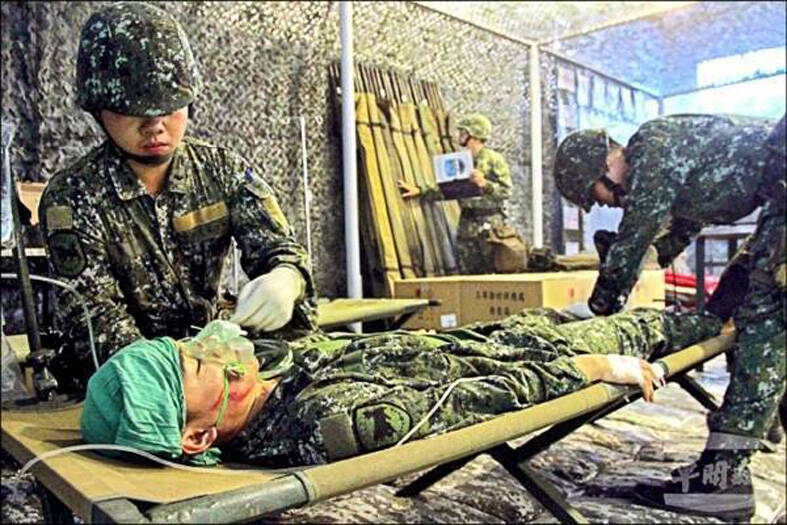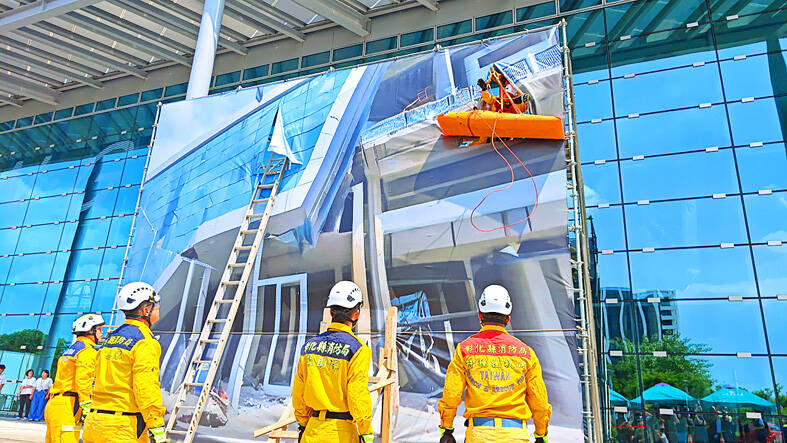The Ministry of National Defense (MND) yesterday detailed efforts to boost the nation’s wartime medical resilience, including a plan to set up a blood donation management unit.
Defense officials made the remarks in a report submitted to lawmakers ahead of Minister of National Defense Wellington Koo’s (顧立雄) question-and-answer session at the legislature’s Foreign Affairs and National Defense Committee today.
The ministry said it had made efforts to enhance the military’s stockpiles, equipment repair and maintenance, digital communications, and battlefield medicine capabilities.

Photo courtesy of the 8th Army Corps
The armed forces have also enhanced its communications with the Ministry of Health and Welfare, the National Fire Agency, county-level public health agencies and hospitals to create a wartime health system, it said.
The military last year conducted seven joint exercises with the civil government and private hospitals, and plans to hold seven more this year, it said.
The planned exercises would focus on certifying hospitals’ ability to stabilize the injured before their transfer to military care and send surgical units to the outlying islands, it said.

Photo: Chen Kuan-pei, Taipei Times
The armed forces by December would found a national blood donation unit, the first organization of its kind, and establish blood banks at hospitals in central, southern and eastern Taiwan, it said.
The MND said next year it would launch the tri-service blood program, a centralized blood supply system to standardize blood policy and operating procedures to secure blood supplies in wartime.
It said it bolstered medical services’ chemical, biological, radiological and nuclear warfare capabilities by certifying military hospitals in Kaohsiung and Hualien.
Military medical services would be able to provide basic care in case of chemical, biological or nuclear attacks anywhere in Taiwan, it said.
The MND and the Ministry of Health and Welfare in 2023 established a reserve capacity that could be activated to provide medical care to wounded military personnel and civilians during an armed conflict, it said.
Officials are creating mobilization plans for nurses and caregivers to deal with non-critically injured civilians at first aid stations across 300 townships, it said.
In other news, the Presidential Office’s Whole-of-Society Defense Resilience Committee said it is on Thursday next week to hold its first-ever field exercise in Tainan.
The exercise would test Taiwan’s capability to respond to a natural disaster that could severely damaging its infrastructure, such as an earthquake and tsunami, it said.
Cabinet officials, the Tainan City Government and the Presidential Office would participate in the exercise, it said.
The committee said its mission is to implement the policy of President William Lai’s administration to strengthen the nation’s resilience against threats posed by natural disasters and authoritarian expansionism.
Improving the coordination between central and local governments, and the private and public sectors is key to make Taiwan’s national defense, civil society, natural disaster response and democracy resilient, it said.
The committee said it would convene its third meeting and hold a news conference in Tainan after the exercise.
The exercise would feature simulations to evacuate people, provide shelter, and establish field hospitals and aid stations, Presidential Office spokeswoman Karen Kuo (郭雅慧) said.
The exercise would have components A and B, which would be conducted at Tainan’s Nanning High School and in front of Anping Harbor tourist information center, she said.

A magnitude 5.6 earthquake struck off the coast of Yilan County at 12:37pm today, with clear shaking felt across much of northern Taiwan. There were no immediate reports of damage. The epicenter of the quake was 16.9km east-southeast of Yilan County Hall offshore at a depth of 66.8km, Central Weather Administration (CWA) data showed. The maximum intensity registered at a 4 in Yilan County’s Nanao Township (南澳) on Taiwan’s seven-tier scale. Other parts of Yilan, as well as certain areas of Hualien County, Taipei, New Taipei City, Taoyuan, Hsinchu County, Taichung and Miaoli County, recorded intensities of 3. Residents of Yilan County and Taipei received

Taiwan has secured another breakthrough in fruit exports, with jujubes, dragon fruit and lychees approved for shipment to the EU, the Ministry of Agriculture said yesterday. The Animal and Plant Health Inspection Agency on Thursday received formal notification of the approval from the EU, the ministry said, adding that the decision was expected to expand Taiwanese fruit producers’ access to high-end European markets. Taiwan exported 126 tonnes of lychees last year, valued at US$1.48 million, with Japan accounting for 102 tonnes. Other export destinations included New Zealand, Hong Kong, the US and Australia, ministry data showed. Jujube exports totaled 103 tonnes, valued at

BIG SPENDERS: Foreign investors bought the most Taiwan equities since 2005, signaling confidence that an AI boom would continue to benefit chipmakers Taiwan Semiconductor Manufacturing Co’s (TSMC, 台積電) market capitalization swelled to US$2 trillion for the first time following a 4.25 percent rally in its American depositary receipts (ADR) overnight, putting the world’s biggest contract chipmaker sixth on the list of the world’s biggest companies by market capitalization, just behind Amazon.com Inc. The site CompaniesMarketcap.com ranked TSMC ahead of Saudi Aramco and Meta Platforms Inc. The Taiwanese company’s ADRs on Tuesday surged to US$385.75 on the New York Stock Exchange, as strong demand for artificial intelligence (AI) applications led to chip supply constraints and boost revenue growth to record-breaking levels. Each TSMC ADR represents

TRUST: The KMT said it respected the US’ timing and considerations, and hoped it would continue to honor its commitments to helping Taiwan bolster its defenses and deterrence US President Donald Trump is delaying a multibillion-dollar arms sale to Taiwan to ensure his visit to Beijing is successful, a New York Times report said. The weapons sales package has stalled in the US Department of State, the report said, citing US officials it did not identify. The White House has told agencies not to push forward ahead of Trump’s meeting with Chinese President Xi Jinping (習近平), it said. The two last month held a phone call to discuss trade and geopolitical flashpoints ahead of the summit. Xi raised the Taiwan issue and urged the US to handle arms sales to